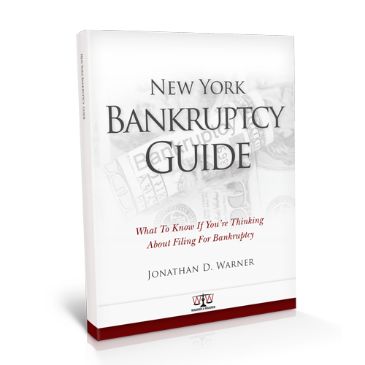What to Know if You’re Thinking About Filing for Bankruptcy
Filing bankruptcy can be scary, but with the New York Bankruptcy Guide created by attorney Jonathan D. Warner it can be your shining light in the dark. Contact us today to schedule a consultation in one of our two conveniently located offices.
Download Our FREE Bankruptcy Guide
 If you are here, you are probably looking into filing bankruptcy, and maybe you’re worried about how this is going to affect the rest of your life. It’s common for people to think that bankruptcy is life-ruining but, it’s actually the beginning of a new chapter in your life. The preconceived notion is that you’re going to lose everything. The only thing that you will actually be losing is your debt. If you want to explore the possibilities and benefits that bankruptcy offers, please call our New York bankruptcy lawyers today to set up a free consultation.
If you are here, you are probably looking into filing bankruptcy, and maybe you’re worried about how this is going to affect the rest of your life. It’s common for people to think that bankruptcy is life-ruining but, it’s actually the beginning of a new chapter in your life. The preconceived notion is that you’re going to lose everything. The only thing that you will actually be losing is your debt. If you want to explore the possibilities and benefits that bankruptcy offers, please call our New York bankruptcy lawyers today to set up a free consultation.
Basic Overview of Bankruptcy
Reasons to File for Bankruptcy in New York
You may be wondering if you should even pursue bankruptcy, as it is not something to take lightly. It certainly is not something you want to or can do without thinking it through, but when it is necessary, it can take a lot of weight off of your shoulders in the end. You may want to file bankruptcy if:
- You are behind on your mortgage payments or facing foreclosure;
- You are unable to make more than “Minimum Amount Due” credit card payments;
- You are maxing out your credits cards and/or taking loans that you know you cannot pay back;
- You have stopped answering your phone and opening your mail to avoid debt collectors demands for payment;
- You are having trouble sleeping at night or are facing increased anxiety due to concerns regarding your financial health.
Bankruptcy law is designed to empower people to take back control of their finances, end the stress caused by debt, and, most importantly, get your life back to normal. There is no feeling in the world as empowering as knowing that your debts have disappeared. There are two primary avenues for you to file for bankruptcy; there is Chapter 7 bankruptcy and there is Chapter 13 bankruptcy. If you are going for Chapter 7 bankruptcy, we will wipe out any unsecured debt, and you get to keep your assets. If you have too much equity in your assets, then we look at a Chapter 13 to save those assets. A good reason to file a Chapter 13 bankruptcy would be that you’ve got tax problems. It doesn’t matter if it’s real estate taxes or income taxes, we can resolve those issues, and if you are behind on payments for a vehicle or it has been repossessed, we can file Chapter 13 and get that vehicle back for you so long as it has not yet been sold.
Chapter 7 Bankruptcy
We like to think of Chapter 7 bankruptcies as the first type of bankruptcy that we will explore as an option for you because it is the least expensive option, and you’ll be in and out of the process in less than four months. The problem is that not everybody has the ability to make a Chapter 7 work for them, and they may have to therefore look at Chapter 13. Our goal with a Chapter 7 is for you to keep all of your property, and wipe out or discharge your unsecured debt. You can walk away free and clear from all of that. When people come in and they are in trouble (perhaps their credit report is not looking too stellar) we want to help. Generally speaking, most of the time, when you file a Chapter 7 bankruptcy, one year after discharge, your credit score is actually going to go up which is a huge advantage that most people are not aware of.
Chapter 13 Bankruptcy
Chapter 13 bankruptcies are actually wonderful because they are so powerful. You can file for bankruptcy and still keep your assets. Chapter 13 bankruptcy was established during the Great Depression when there were so many foreclosures going on that the banks were actually looking at bankruptcy themselves. Congress stepped in, and passed the legislation so that you could file a Chapter 13 bankruptcy. What it basically boils down to is if you’re behind on your mortgage payments, or you’re behind on your real estate taxes, we simply go and put those into a Chapter 13 plan and allow you to pay them back. It really is a wonderful thing that can allow you to keep your home. We also can use that on a vehicle to get that back for you, and put the payments through a Chapter 13. That does two things: It extends the term, and reduces the interest. That way you can keep all of your assets, even if you’re in trouble. Also if your income taxes are a bit older, it’s possible to simply discharge those taxes, but generally speaking, that’s not the case. Income taxes have to be paid back, whether it’s federal or state, and we put those income taxes into a Chapter 13 plan to allow you to pay them back over 60 months, and there’s no interest and no penalties when you do that.
Download Our FREE Bankruptcy Guide
Frequently Asked Questions | New York Bankruptcy Guide
How Do I Prepare for Bankruptcy?
 During a free consultation you should get a folder. It has information in it. It has the breakdown of exactly what the rules are. You and your assets are all protected. It’s a breakdown as far as the fees go, as far as what the filing fee is, what an attorney fee is, and then, on the back, there’s a list of what documentation is needed on each case. Each jurisdiction is a little bit different on that, but they all require a certain amount of documentation with, paystubs, income tax returns, etc. You will need to gather that information to begin the process
During a free consultation you should get a folder. It has information in it. It has the breakdown of exactly what the rules are. You and your assets are all protected. It’s a breakdown as far as the fees go, as far as what the filing fee is, what an attorney fee is, and then, on the back, there’s a list of what documentation is needed on each case. Each jurisdiction is a little bit different on that, but they all require a certain amount of documentation with, paystubs, income tax returns, etc. You will need to gather that information to begin the process
Will I Qualify for Bankruptcy?
Anyone can qualify for bankruptcy, but the question becomes pursuant to the changes in bankruptcy law, which took effect on October 17th, 2005. Do you qualify for a Chapter 7 bankruptcy? If you must file a Chapter 13 bankruptcy, are you going to be able to pay the minimum that is allowed? The key here is unsecured creditors, and what people have trouble sometimes getting in their mind and understanding is that that is where your savings is on a Chapter 13. In other words, that’s where you get your savings.
How Long Does Bankruptcy Stay on Your Credit Report?
When the banks and the credit card people learned in early 2000s that over a million people were filing for bankruptcy a year, and they considered how many of those people were potential customers that they were going to lose over a ten year period. That’s ten million people, over ten million people that they were going to go and discriminate against and not give credit to for ten years. They’re a little bit greedy so they decided that they weren’t going to discriminate against people like that anymore, and they were going to go and give you credit in the quite near future.
After one year of discharge on a Chapter 7 or a Chapter 13, your credit score is going to go up approximately 100 points. You’re going to be able to go and get credit cards in the near future, in less than a year. I would start off with the easy ones like your gasoline cards, Sears or something like that and then work up to a MasterCard or Visa.
It’s really pretty easy now to get a vehicle loan after you’ve filed a bankruptcy for a couple of different reasons. The timeline for a vehicle loan is about five or six years and you can’t file another Chapter 7 bankruptcy for eight. They know that you’ve got to have a vehicle to go back and forth to work and take care of your family, so they consider that you’re going to have a five-year term of making payments and you can’t follow Chapter 7 for another eight years, so it’s a pretty good risk. Also, you’ve worked out all that unsecured debt so they don’t have to worry about your down payments instead of your vehicle. That’s why they approve those pretty easily.
With mortgages, however, you’re looking at somewhere between two and a half and three years to be considered for a mortgage. After bankruptcy, the future is pretty bright.
Do I Have Non-Dischargeable Debts?
You should know that 99% of the debts are discharged in bankruptcy. The exceptions are going to be if they have something to do with family court or maybe there’s a judgment in some kind of fraud, something like that. Fraud or family court or divorce is not going to be affected by filing a bankruptcy, either Chapter 7 or Chapter 13, but all the rest of the stuff will be discharged and gone.
Protecting Assets
The goal of an attorney is to protect all of your assets. Chapter 13 is designed to save your house, your car, and the typical assets. The same is true with Chapter 7. As long as we’ve got enough exemption power to protect those assets, they’ll be protected. Otherwise we’ll file Chapter 13 for you.
For Chapter 13, you have to pay back money to protect your assets after everything is said and done.
Chapter 7 is a little bit different in particular with luxury assets. Boats, motorcycles and airplanes are luxuries and at any time, the US Trustee can step in and tell you that you should be allocating your money to your debt rather than your luxury asset and that you need to covert to Chapter 13. That rarely happens when you hire a competent bankruptcy attorney.
What Can Bankruptcy Do for Me?
 It’s going to stop not only the creditors calling you, writing you, texting you, and emailing you, but it’s also going to protect all of your assets. You don’t have to worry about losing your house or your car. Generally speaking, it stops all of the litigation. The only exception would be something like family court or divorce.
It’s going to stop not only the creditors calling you, writing you, texting you, and emailing you, but it’s also going to protect all of your assets. You don’t have to worry about losing your house or your car. Generally speaking, it stops all of the litigation. The only exception would be something like family court or divorce.
It allows you to be protected while you get your situation under control. If it is just an unsecured problem; credit cards and medical bills, credit lines, whatever the case may be, then a Chapter 7 is just going to wipe that out. You’ll walk away free and clear of that in four months. Whereas if you’ve got a much more complex situation such as you’re behind on your house, or more complex situations like that, then we’re going to file a Chapter 13.
The whole purpose of the Chapter 13 is to get you under control so that every debt collector can get paid what they’re entitled to under Chapter 13 bankruptcy. Generally speaking, everyone gets paid over a term of up to five years, at the shortest three years. The exceptions of course are your unsecured creditors, including your credit cards, your medical bills, your credit lines; they are going to take a hit. Our goal is to save you from 95% of that debt. You can pay back that 5% over five years.
Call Our Office Today
At Warner & Warner, PLLC we understand that there is no “one-size-fits-all” approach to debt relief. Your unique financial situation requires a custom-tailored solution. We offer free consultations to every prospective client, as there should never be a charge to find out what your options are. We are even available for evening appointments. We can also provide non-bankruptcy foreclosure prevention counseling to explore alternative avenues to save your home. If you are looking for a safe and trusted place to land to begin your bankruptcy journey, please call our office today.
Download Our FREE Bankruptcy Guide